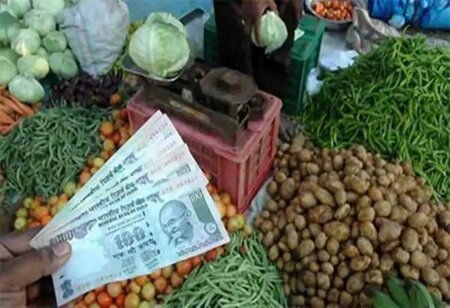Retail inflation declines to 7.04 percent in May, still above RBI’s upper limit of 6 percent
 India’s retail inflation declined moderately to 7.04% in May from a year ago when compared to an eight-year high of 7.8% in April. This is helped by a favourable base effect. Consumer prices, however, continued to breach the Reserve Bank of India’s (RBI) upper limit of 6% for the fifth straight month, official data released on Monday showed.
India’s retail inflation declined moderately to 7.04% in May from a year ago when compared to an eight-year high of 7.8% in April. This is helped by a favourable base effect. Consumer prices, however, continued to breach the Reserve Bank of India’s (RBI) upper limit of 6% for the fifth straight month, official data released on Monday showed.
Prices edged down slightly compared to April mainly on account of a statistical base effect and a cut in central excise duties on petrol and diesel. A Bloomberg poll forecast retail inflation measured by the consumer price index (CPI) was likely to slip to 7.1% in May from a year ago.
The base effect refers to a statistical reading in which a value, such as GDP or inflation, can appear to be low if that value is compared to a previous period of an abnormally high value and vice versa.
Inflation globally has hit the highest levels in decades, with Russia’s invasion of Ukraine pushing up prices of everything, from energy to food, squeezing households.
Data on Monday showed inflation in food and beverages stood at 7.97% in May compared to an 8.31% rise in April, while price increases in rural areas dropped to 7.01% against 8.38% in the previous month. Urban inflation came in at 7.08%.
Retail inflation, which has stayed above the central bank’s target of 4 (+/-2)%, has averaged 6.7% in 2022-23. Some economists fear price pressures triggered by the Ukraine conflict and supply bottlenecks could trigger a return to 1970s era inflation and slowing growth, stoking fears of a recession.
Rising consumer prices have presented a challenge for the central bank, which has hiked rates by 90 basis points - – one basis point is one hundredth of a percentage point – over the past 30 days to tame prices.
“A fifth consecutive print above 6.0% and the second above 7.0% this year would continue to mean front-loaded rate action by the RBI,” said Kunal Kundu, India economist at Societe Generale, Bengaluru.
Most analysts say supply-side measures, such as cut in fuel levies and restrictions on food exports, will take time to have an effect on prices.
Last week, RBI raised the repo rate by 50 basis points to 4.9%. The central bank also sharply raised its inflation projection. Prices are seen increasing to 7.5% in the June quarter and 7.4% in the September quarter.




